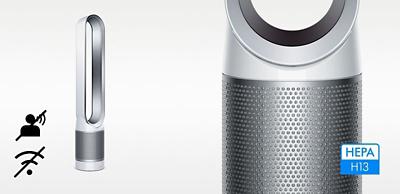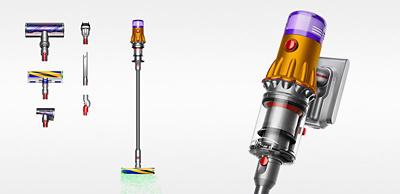Guide | July 14, 2023

What is an air purifier?
Air purifiers can improve air quality and circulate clean air. By trapping mould spores and odours, and removing particles including airborne irritants, they can be effective at removing the source of allergens.
It’s worth noting that the benefits will be affected by the air purifier’s specifications and filter type.
-
Allergens
An allergen is a substance that can cause an allergic reaction by triggering the body’s immune system. Common indoor allergens include dust mite droppings, pet dander, mould, and pollen.
-
Bacteria
Microscopic, single-celled organisms that exist in their millions, in every environment. Not all bacteria are harmful, but some can have adverse effects, such as E. coli.
-
Benzene
Benzene is colourless, flammable liquid produced by both natural and man-made processes. It’s a natural part of crude oil, gasoline, and cigarette smoke. Indoors, it comes from products such as glues, paints, furniture wax, and detergents.
-
Carbon dioxide (CO₂)
A colourless greenhouse gas, which comes from the extraction and burning of fossil fuels. Increased CO₂ levels can impact cognitive function.
-
Formaldehyde
This colourless, flammable gas is used in some building materials and household products. Sources can include some fabrics found in flooring and furniture, glues, paints, varnishes, air fresheners, and household cleaners.
-
H1N1 virus
This subtype of Influenza A virus, also known as swine flu, caused a global flu outbreak. H1N1 produces respiratory infectious diseases in humans and pigs. Symptoms can be similar to seasonal flu.
-
HEPA 13
HEPA (High Efficiency Particulate Air) is an air filter efficiency standard and a measure of a filter’s performance. To achieve this standard, filters must meet a minimum of 99.97 per cent particle removal at the most penetrating particle size.
-
Humidification
A process of increasing air moisture content through the addition of water vapour or steam. Humidifiers can add moisture to the air in dry conditions, creating a more comfortable indoor environment when needed.
-
Microns
Airborne particles are usually described in microns. One micron is equal to one-millionth of a metre. The human eye can see debris and dust that are approximately 25 microns in size.
-
Nitrogen dioxide (NO₂)
Nitrogen dioxide is a liquid below 21.2 °C and a gas at higher temperatures. It is toxic to humans in both states. Gas stoves and space heaters are the most common indoor sources of NO₂ emissions. Other sources include improperly vented furnaces and water heaters.
-
Pet dander
Pet dander is made up of tiny particles of skin, saliva and urine, shed by animals with fur or feathers. Pet dander lingers in the air before settling on surfaces such as furniture, bedding, and fabrics. Exposure to these airborne particles can trigger allergies.
-
Particulate matter (PM)
Particulate matter contains microscopic solids or liquid droplets, measured in microns. Indoor PM can be generated through many day-to-day activities such as cooking, cleaning, and the burning of candles and fires.
-
Purification
The process of making something free of any contaminants or physical impurities. Air purification is designed to filter the air in your home – removing pollutants such as dust, allergens and viruses.
-
Volatile organic compounds (VOCs)
Volatile organic compounds are potentially harmful gases found in many household products. Common sources include paints, varnishes, air fresheners, cosmetics, and cleaning products.
-
Pollen
Pollen is a powdery substance released from seed plants as part of their reproduction process. It typically appears from trees in the spring, grasses in the summer, and weeds in the autumn. Pollen grains are among the most common allergens.
-
House dust mites
Dust mites are tiny insects that commonly live in household dust. They are one of the biggest causes of allergies. Each gram of house dust contains approximately 1000 dust mites.
-
Aspergillus mould
A common name for a visible group of fungi, mould thrives wherever there is dampness – sending out millions of spores into the air. Exposure to mould occurs via inhalation, skin contact, or ingestion.
-
How do air purifiers work?
The two basic elements of an air purifier are a fan and a series of filters. The fan draws in polluted air to the filters, which capture and remove airborne pollutants, before expelling cleaner air.
Most purifiers capture particles like dust and pollen, but the best air purifiers with high efficiency particulate air (HEPA) filters can remove air pollutants as small as 0.1 microns, thanks to their multi-layer network of fine threads. Activated carbon filters can also help to remove odours.
An air purifier engineered with HEPA and activated carbon filters can work effectively against pollens, fine particles, Volatile Organic Compounds (VOCs), viruses and bacteria. Dyson purifiers can remove up to 99.95% of particles as small as 0.1 microns.⁴
-

Air purifiers for pollen allergies
If you’re one of the millions of people who suffer from pollen allergies, you’ll likely experience sneezing, congestion, a runny rose, and other uncomfortable symptoms as allergy season arrives.
Pollen is a fine powder made up of tiny particles. It’s released during the early spring and summer months by plants, trees and grasses as part of their reproductive cycle. Pollen causes a common allergic reaction known as hay fever, which since it occurs at particular times of the year, is also known as seasonal rhinitis.
Rather than opening windows on warm days, try using an air purifier to clean your indoor air, keep you cool, and capture ultrafine dust and allergens. Using an air purifier with a HEPA filter between March and September will help remove pollen allergens from the air you breathe.
Air purifiers for pet allergies
Our furry friends can bring plenty of joy, but also a few microscopic surprises into the home, including pet dander, pollen, and viruses. What’s more, you may find that cuddling your pet leaves you sneezing, coughing or rubbing your eyes. It’s estimated that pet dander allergies affect up to 20% of people around the world.⁵
It’s possible to remove the particles that trigger allergies caused by pets using a good air purifier. Approximately 75% of cat dander particles are 5-10 microns in size, and 25% are 2.5 microns or smaller.⁶
Air purifiers for dust allergies
Dust mites can be a major indoor trigger for people with allergies and asthma. Fortunately, an air purifier effectively removes dust, including dust mite allergens, and can help you breathe easier.
Most exposure to dust mite allergens occurs while sleeping and when dust is disturbed during bed-making. An air purifier in your bedroom can help trap these allergens before they have a chance to settle.
Shop the solution
Read more
Press contacts
United Kingdom
Email us at press.office@dyson.com
Social media
Twitter: @dyson
Instagram: @dyson, @dysonhair
LinkedIn: Dyson
Facebook: facebook.com/dyson
YouTube: youtube.com/dyson
¹Hulin et al, Respiratory Health and Indoor air pollutants based on quantitative exposure assessments, European Respiratory Journal, October 2012.
²Klepeis, N. E.; Nelson, W. C.; Ott, W. R.; Robinson, J. P.; Tsang, a M.; Switzer, P.; Behar, J. V; Hern, S. C.; Engelmann, W. H. The National Human Activity Pattern Survey (NHAPS): A Resource for Assessing Exposure to Environmental Pollutants. J. Expo. Anal. Environ. Epidemiol. 2001, 11 (3), 231–252.
³Bumbacea et al (2020). Mite allergy and atopic dermatitis: Is there a clear link? (Review), Experimental and therapeutic medicine, 20 (4).
⁴Tested for filtration efficiency at 0.1 microns (EN1822, ISO29463).
⁵Chan, S and Leung, D (2018), Dog and Cat Allergies: Current State of Diagnostic Approaches and Challenges, 10 (2), 97-105. Available at: https://www.ncbi.nlm.nih.gov/pmc/articles/PMC5809771/
⁶Luczynska CM, Li Y, Chapman MD, Platts-Mills TA. Airborne concentrations and particle size distribution of allergen derived from domestic cats (Felis domesticus). Measurements using cascade impactor, liquid impinger, and a two-site monoclonal antibody assay for Fel d I. Am Rev Respir Dis. 1990 Feb;141(2):361-7. doi: 10.1164/ajrccm/141.2.361. PMID: 2301854.



















